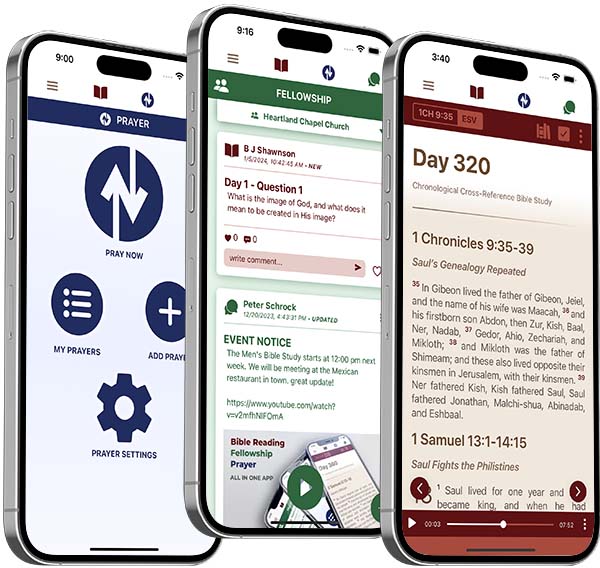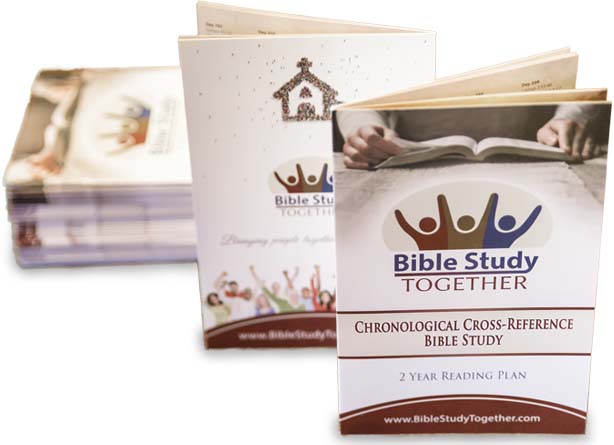How to Start Your Bible Study!
Whether you are a church, family, or Bible study group we have what you will need to get your people daily reading the Bible together! Check out our tools and resources below so you can study the Bible chronologically.
PROMOTE YOUR BIBLE STUDY
Personal connection is the most powerful motivator to get people to join your Bible study. However, this often isn’t enough. When it comes to inspiring people to join a Bible study, few things work better than a video. Therefore we have created several videos you can share before your church service or through social media leading up to the launch of your Bible Study. Personally asking people to join your study and showing them some videos will get your group ready to start!
BIBLE STUDY PLAN TOOLS
Every person is going to have different preferences when it comes to studying the Bible with a mobile device, printed Bible, or computer. What if you didn’t have to deal with this conflict and make everyone happy? This is what we have done with our Bible Study Together Chronological Cross-Reference Bible Reading Plan. Below you can find out the options we have available for your group.
Chronological Bible Plan App
Do you want to read the Bible while listening to it at the same time? Check out the Bible Study Together app! It’s a free app that includes the complete texts in ESV, NLT, KJV, and NASB translations. There are also videos to go along with each day’s reading and maps of the cities mentioned in the Bible. The app also lets you ask questions and have discussions with others using its fellowship tools. Unlike other social platforms, there are no ads to distract you from reading God’s word. You can use the fellowship tools to answer the daily questions, share prayer requests, and stay connected with your group members. The app also helps you manage prayer requests and has a feature to help you stay focused during prayer. In short, the Bible Study Together app is perfect if you want to have a dedicated time for studying the Bible and praying without distractions. Download the app today.
Chronological Bible Study Journals
Our study journals are available in print, but you can also print them yourself if you have the PDF version of our chronological Bible reading plan. These journals are made to help you meditate on God’s word and pray, and they also tell you where to read in your printed Bible. Each day, the journal will guide you through the Chronological Cross-Reference Bible reading plan and ask open-ended questions that make you think. It also encourages you to write down your prayers and helps you think about how to use what you’ve read. If you like writing things down to understand them better, these study journals are perfect for you. By using them, you’ll create a record of your spiritual journey with God that future generations can value. Don’t miss out – get your study journals now!
Chronological Bible Reading Plan Booklets
Do you have a favorite study Bible and a special way of connecting with God? Well, look no further because Bible Study Together has high-quality booklets that have the complete Chronological Cross-Reference Bible reading plan. These booklets are made to fit perfectly in most Bibles and are durable enough to last for years. With these booklets, you can make your time with God personal while still knowing where to read each day. These booklets are great for individuals, as well as small groups or whole churches. Bible Study Together makes sure everyone is on the same page by giving them this plan and pointing them to the right resources for their needs. Don’t hesitate, order your booklets today!
Bible Study Group Tips
All Bible studies should not be run the exact same way. Depending on the level of commitment from your group, you will need to decide how your members will participate. Some studies are done completely remotely and people share through a Bible app or group messaging tool. Other Bible studies are in person and require a regular time to gather. Some groups do both. In general, we believe the highest engagement happens when groups are doing both. Whether or not a group meets in person, you also need to consider if the study will require personal preparation to be able to participate in the group. We have found the highest engagement can happen when people in the group can participate well if they study throughout the week or just show up to a gathering. Defining what participation means for your group is essential when inviting members and keeping them engaged over the long haul.
Remote Bible Studies
Not every group can meet together regularly and as a result, this can be a good reason to have a remote Bible study. We define a remote Bible Study as a group where people participate through an online forum or Bible app chat tool. Two things to consider when planning a successful remote study are personal connection and accountability.
Remote studies can foster a disconnect where the people studying together are unable to recognize that the others in their group are real people. When this happens, it can create loneliness or even vicious debates between group members. For this reason, we encourage remote studies to form into smaller groups and if possible form these groups from people who already have a personal relationship with each other. Group sizes under 20 people can tend to make for more open sharing. It also gives people the opportunity to become more familiar with each person in their group. If you have a large audience and want to do a remote study with them all, we encourage you to find a way to segment them into smaller groups.
When people feel more connected to the others in their group, healthy accountability naturally follows. Accountability is not people sitting around admitting to their failures. It is when people are advocates for each other, cheering them on and guiding them to make good decisions. When people feel connected to others in their group they are willing to receive input from them and they are sensitive to keeping the relationship healthy. This can prevent vicious debates and help your members grow spiritually.
Facilitating in-Person Bible Studies
Whether or not your group uses a tool like an app to stay connected through the week while doing a Bible study, in-person meetings are ideal for most groups. In-person group Bible studies offer a unique opportunity for participants to engage in face-to-face discussions, foster personal connections, and experience a sense of belonging within a community. The tangible presence of fellow believers creates an atmosphere for immediate interaction, allowing for non-verbal cues, physical touch, and shared experiences that enhance the overall learning experience. In the following sections, we will look at how to get the most out of your in-person group study time.
Consistent Clear Time
One key aspect of facilitating in-person Bible studies is setting a clear and consistent time for the sessions. While it may seem simple, having a designated time for gathering together can greatly enhance the effectiveness and success of these studies. When participants know exactly when and where the Bible study will take place, it brings a sense of structure and reliability to the group. This regularity allows individuals to plan their schedules accordingly and prioritize attending the study. Additionally, a consistent time helps build a sense of community among the participants. It fosters a sense of commitment and dedication as everyone comes together at the same time each week to explore and discuss the word of God. Moreover, setting a clear and consistent time for the Bible study demonstrates respect for everyone’s time and shows a commitment to the study itself. By establishing and adhering to a specific schedule, facilitators are showing their dedication to the group and creating an environment where everyone can fully engage in the study.
Creating Space for Discussion
One crucial aspect of running a successful Bible study is to create an environment where everyone feels comfortable and encouraged to participate. To achieve this, it is important to give people ample time to talk during the discussion. While it is beneficial to have a lively conversation, it is equally crucial to limit talkers who may dominate the discussion and overpower the voices of others. Setting some ground rules at the start, such as only allowing people to talk for 5 minutes before giving someone else a turn, can help create a balanced conversation. Additionally, it is important to allow moments of silence, especially for those who may be hesitant to share their thoughts. By creating a safe and inclusive space, where all people are valued, participants will feel heard and more willing to engage in meaningful discussions.
Steering the Conversation
When leading a Bible study, it is crucial to guide the conversation in a way that ensures participants engage in fruitful and edifying discussions. Steering away from topics that do not contribute to the study’s purpose is essential to maintain focus and encourage spiritual growth. Keep the conversation personal, allowing individuals to share their own experiences, reflections, and insights. This allows for a more relatable and intimate environment where participants can connect on a deeper level. Additionally, incorporating practical applications of the study’s lessons helps participants apply biblical principles to their everyday lives. By keeping the discussion centered on personal experiences, practical insights, and the study’s content, you can facilitate a successful Bible study that encourages spiritual growth and fosters a sense of community among participants. If you find your group is often getting derailed, then it may be time to set some ground rules for your group members before you start each week. When people know what derailed looks like, it can make it easier to bring it up and help the conversation get back on track.
Use Questions Wisely
Use the right types of questions. When it comes to running a successful Bible study, one crucial aspect to consider is the wise use of questions. A common mistake many leaders make is jumping straight into specific questions without setting a context. It is essential to begin with general questions that allow participants to reflect and share their initial thoughts. This approach encourages openness and engagement from everyone involved. However, as the study progresses, it is equally important to transition into more specific questions that delve deeper into understanding the text. By doing so, the participants can explore and discuss different perspectives, facilitating a rich and thought-provoking group discussion. Another vital tip is to discern the right types of questions suitable for a group discussion. While study questions serve their purpose in individual reflection and understanding, they might not always be the best fit for a group setting. Instead, focus on questions that encourage interaction, dialogue, and exchange of ideas among the participants. This not only promotes a interactive environment but also helps participants gain new insights and grow in their understanding of the Bible.
Navigating Conflict
It is vital to create an environment that fosters healthy discussion and avoids unnecessary conflict when running a successful Bible Study. Disagreement is natural and shouldn’t be discouraged, as it can lead to deeper understanding and growth. However, it is essential to establish boundaries and ensure that individuals do not become emotionally heated or resort to arguing. In situations where tensions rise and sparks fly, it is best to address the issue outside the group rather than allowing the entire group to witness the confrontation. Heated confrontations often create confusion, fear, and division. By encouraging private resolution, individuals can have open and honest conversations while maintaining overall harmony.
Creating Comradery in Your Group
One of the key elements to running a successful Bible study is creating a sense of comradery within your group. People who only want to learn more about the Bible and their relationship with God can study on their own. However, people often join Bible studies with the desire to connect with others who share a similar interest in learning more about God and the Bible. Fostering a welcoming environment is essential to strengthen relationships and encourage meaningful discussions. You can begin by creating opportunities for participants to get to know one another, such as icebreaker activities and sharing personal experiences. Encourage open and respectful dialogue, allowing individuals to express their thoughts and ask questions freely. By prioritizing a sense of community and building connections among members, your Bible study will not only deepen participants’ understanding of God’s word but also provide a space for authentic relationships to flourish.
To foster these bonds, it is helpful to do more than simply study the scriptures together. Incorporating fun activities into your Bible study routine can greatly enhance the sense of togetherness and deepen your relationships with one another. Consider organizing occasions such as going out to eat together, embarking on a canoe trip, enjoying a golf outing, or even planning themed snacks and dress-ups during your study. These activities not only provide an opportunity for enjoyable moments but also create lasting memories that will strengthen the bonds among group members. Additionally, organizing a game night, a camping trip, or engaging in community service projects together can further solidify the sense of comradery within your Bible study group. By fostering an environment of fun and shared experiences, you will cultivate friendships that extend beyond the study itself and promote a deep sense of unity and support.
Choosing the Right Study for Your Group
Choosing the right Bible study tools for your group is vital. There are various types of studies available, and selecting one that aligns with your group’s needs and interests is crucial. One option is a topical study, where specific themes or subjects are explored and discussed. This kind of study allows participants to focus on particular areas of interest or areas that need growth. Another option is a Bible reading plan study, where the Bible itself is used to guide the members. Bible Study Together focuses on this type of study as it often helps people connect with the scriptures in context. We have found the Bible often meets people where they are when using this type of study.
After knowing what type of study you want to use, the next important thing to consider is what kind of resources are available with the Bible study. Some Bible studies provide printed study guides, videos, or app/online resources that can enhance the learning experience. The Bible Study Together app curates all your resources together and connects your group through their private social network. It also has printed study journals and more. If you are looking for options, Bible Study Together has you covered.
Bible study plans can have a wide degree of commitment. Deciding on the study commitment that works best for your group is necessary. Some groups may prefer a daily commitment, where members engage with the material individually every day and then gather weekly to discuss and share insights. Other groups may find a weekly commitment more suitable, where participants study the material together during the meetings. Ultimately, the right choice depends on the availability and preferences of your group members. Making it work for your group is key, so a combination of both daily and weekly commitments can often be best. This can be achieved by giving people the resources to study throughout the week. However, when you are together, your group can read and focus on a particular part of the weekly study. Choosing the right study format and commitment will ensure that your Bible study leads to meaningful growth and impactful discussions.
Conclusion
Running a successful Bible study requires careful consideration and planning. Setting clear goals and objectives, whether in-person or remote, is essential for keeping everyone focused and engaged. Providing a consistent and clear time for the study helps establish a routine and builds anticipation. Facilitating the discussions by giving people time to talk, guiding the conversation, and using questions wisely allows for a deeper exploration of the text. Creating comradery within the group strengthens the sense of community and encourages participation. Lastly, selecting the right study materials tailored to the group’s needs and interests helps maximize the impact of the Bible study. By implementing these strategies, you can foster an environment where participants can grow spiritually and develop meaningful connections with one another.




